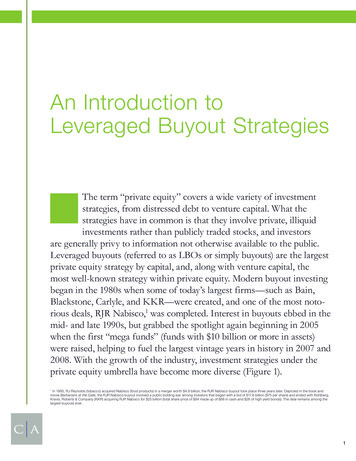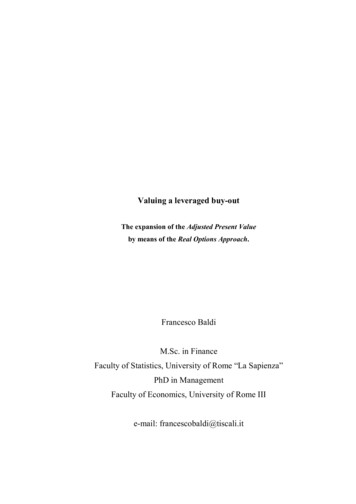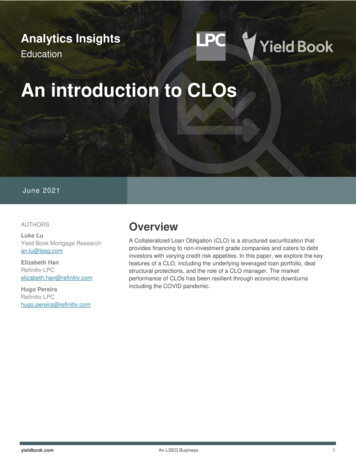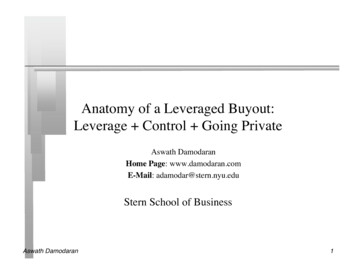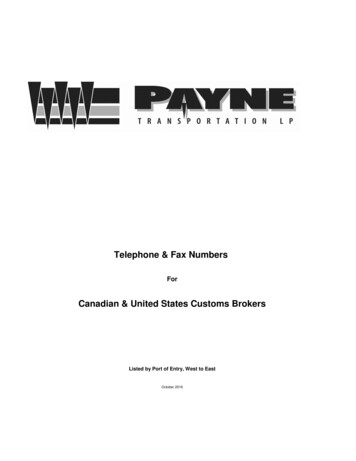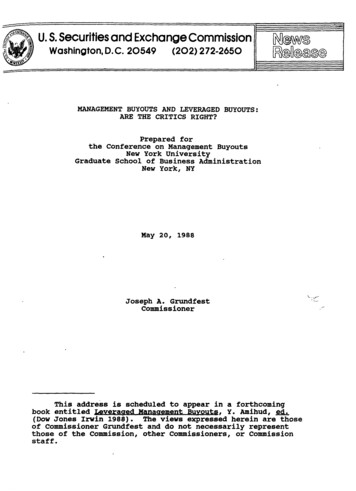
Transcription
u. S.Securitiesand Exchange CommissionWashington, D.C. 20549(202) 272-2650[M@\YM' [Ri@ @ @MANAGEMENT BUYOUTS AND LEVERAGED BUYOUTS:ARE THE CRITICS RIGHT?Prepared forthe Conference on Management BuyoutsNew York universityGraduate School of Business AdministrationNew York, NYMay 20, 1988Joseph A. GrundfestCommissionerThis address is scheduled to appear in a forthcomingbook entitled Leveraged Management Buyouts, Y. Amihud, (Dow Jones Irwin 1988). The views expressed herein are thoseof Commissioner Grundfest and do not necessarily representthose of the Commission, other Commissioners, or Commissionstaff.
MANAGEMENT BUYOUTS AND LEVERAGED BUYOUTS:ARE THE CRITICS RIGHT?Joseph A. GrundfestManagement buyouts ("MBOs") and leveraged buyouts("LBOS") have been subject to extensive criticism.1Theyhave been reviled as unfair to stockholders, threatening toemployees, and inhospitable to long-term corporate planning.The companies involved in these transactions are allegedlydangerous to themselves and others because their high debt-toequity ratios leave them economically vulnerable, partiCUlarlyif interest rates increase or if the economy suffers arecession.The bankruptcy of Revco Drugstores, only 18 months afterits management buyout, has recently added fuel to these fears.Further concern has been generated by the rapid growth ofmultibillion dollar leveraged buyout funds.Here, theapprehension is that in order to "do deals" necessary tocommit billions of dollars in available capital, fund managerswill be pressured into paying premium prices that lead tounsustainable leverage, thereby further threatening the1 , ,Lowenstein, Management Buyouts, 85 Colum. L.Rev. 730 (1985); Lipton, Corporate Governance in the Age ofFinance Corporatism, 136 U. Pa. L. Rev. 1 (1987); Morrisey,Law, Ethics and the Leveraged Buyout, 65 U. Det. L. Rev. 403(1988). The term "leveraged buyout" refers generally to anacquisition in which the purchase price is financedpredominantly with debt to be repaid by cash flow generated bythe acquired firm. If management of the acquired companyparticipates significantly in the buy-out by holding equity inthe new leveraged firm, the transaction is referred to as amanagement buy-out. Management buyouts are thus a subset ofleveraged buyouts.
2competitivefabric of an increasinglylarge numberof MBO andLBO companies.2These concernsof the economicare expressedby many respectedscene and, as CongressmanMarkey makes clearin his address, they are shared by influentialWashington. 3These concerns are, I believe,understandable.an obligationsupportsThe academicand financialto respond with crediblepolicymakersinquitecommunitiesevidenceor rejects the factual premisesobservershavethat eitherupon which theseconcerns are based.My review of the evidenceare, however,quite differentleads me to conclusionsfrom those expressedcritics of MBO and LBO transactions.demonstratesthat some of these transactionswhile others are failures.reinvigoratedExperiencecompaniesby manyto dateare successesAmong the successesthat have regainedthatarea sharp2See, ,A.C. Wallace, All Dressed Up and No Place toGo?, N.Y. Times, Aug. 6, 1988, at F1, col. 2; J. Lewis,Everybody Into the Pool, Institutional Investor, July 1988, at141.3Markey, Remarks of the Honorable Edward J. Markey.Chairman. House Subcommittee on TelecommunicationsandFinance. Before the New York University Conference onManagement Buyouts, [this volume, at p.]. See alsoLeveraged Buyouts and the Pot of Gold: Trends, Public Policyand Case Studies, A Report Prepared by the Economics Div.Congo Res. Servo for the House Subcomm. on Oversight &Investigations of the Committee on Energy and Commerce, CommaPrint No. 100-R, looth Cong., 2d Sessa (Dec. 1987).
3competitive edge as a result of a management buyout.4Amongthe failures are companies that may well have encounter ddifficulties as a result of the financial pressures imposed byleveraged transactions.5Public policy cannot, however, be guided solely bysuccesses.Nor should it be dominated by failures.Rationalpublic policy must be guided by the best available evidenceregarding the aggregate consequences of these transactionsmeasured on average and over time.Individual anecdotes, nomatter how compelling when considered in isolation, can easilymislead.Viewed from this perspective, and taking fullaccount of the undeniable risks involved in many of thesetransactions, the preponderance of the evidence stronglysuggests that MBOs and LBOs are beneficial for the companiesinvolved and for the economy as a whole.The successes faroutnumber the failures, and many of the costs associated withthese transactions have been substantially exaggerated.In order to appreciate the benefits that result fromthese transactions, it is useful to draw an analogy betweenbuyouts. and the operation of the venture capital sector.Venture capital is an undeniably risky business.It is a4See, ,When Power Investors Call the Shots, Bus.Wk., June 20, 1988 at 126 (discussing Borg Warner, IglooHoldings, Cortec Industries, spinoffs of ITT Corp., Seven-Up,Dr. Pepper, Beatrice, and Cain chemical).5 (discussing Revco, Republic Health, and Dart Drug).
4trivial matter to identify startup companiesgone bankruptcosting their backers many millionsand occasionallyfinanciallythat have quicklyof dollars--making even the most technologicallysophisticatedinvestorslook foolish.andIf theventure capital industry were jUdged solely by its risks andfailures, that entire sector of the economy would be acandidateto be shut down.Fortunately,the pUblic policy process has not provedshort sighted or risk averse.appreciatethe tremendouscapital industry.PolicymakerssuccessesThey appreciateare able tospawned by the venturethe extraordinarythat can be called forth when entrepreneursequity stake in the businessesbusinessessignificanthave a substantialsmall group ofactive investors who have a direct andfinancialenterprise.stake in the success or failure of theThe value added by the entrepreneurialassociatedwith venture capital operationsrecognizedthat many foreign countriessought to replicateby providinginducementshave specificallyto entrepreneurscapitalrisks.6capitalInstead of starting a firm from scratch,6see, ,(1986); Melcher,successand investorsBuyouts are closely related to ventureCapitalists,energyis so wellthe United states' venturewilling to take venture capital-typeenterprises.valuethey run and when thoseare overseen by a relativelyknowledgeable,soaJohn W. Wilson, The New Venturers 219-230A continental Spending Spree for VentureBus. Wk., Aug. 29, 1988, at 41.
5buyout recreates venture capital-type incentives withinexisting firms by providing management with strong, equitybased incentives combined with aggressive oversight frominvestors who have substantial capital at stake.The economicbenefits that result from reinvigorating large, establishedcorporations that may have grown a bit lazy or sluggish areevery bit as real as the benefits that result from theformation of new firms.Thus, just as society applauds therisk taking inherent in venture capital operations, it makessense, I think, to view buyouts in an equivalent light asrisky but beneficial opportunities for industrial rebirth atfirms that may not be living up to their full potential.While there is extensive debate over the sources of gainthat result from buyouts, the most significant gains result, Ibelieve, from the reduction in agency costs that occurs whenmanagement is given an opportunity to share a substantialequity stake in the firm they operate.7Buyouts thusreintegrate management interests with equity incentives andresolve the classic Berle-Means problem that arises whenownership is separated from control.8Managements are thereby7See generally Jensen, Agency and Costs of Free CashFlow. Corporate Finance and Takeovers, 76 Am. Econ. Rev. 323(1986).SA. Berle & G. Means, The Modern Corporation and ErivateProperty (1932).
6motivatedto adopt efficiency-enhancingmeasuresthat simplydo not occur in pUblicly traded firms with diffuseAs the co-head of corporateexplains,these transactionsowne ship.9finance at McKinsey"are so immensely& Companysuccessfulbecause they are better managed."10Indeed, there is noshortage of war stories describinghow a firm taken privatein an MBO or spun off in an LBO increased productivitydirect result of managementunder prior ownershipof testimonialsstructures.l1from businessbuyout transactionsmotivationimprovementsas athat were infeasibleThere is also no shortageexecutiveswho participatedinand say "[i]t's amazing what a littledoes for the bottom line."129critics of MBO-LBO transactions occasionally contendthat such management improvements should be forthcomingwithout MBO-LBO transactions, and that shareholders areshortchanged because they must be bought out before theseimprovements take place. The available evidence, however,suggests that the strategies involved in MBO-LBO transactions"increase the risk associated with the managers undiversifiedhuman capital" and that managers will not consent to suchlevels of risk without being offered the opportunity at leastto participate in the larger rewards associated with MBO-LBOtransactions.Gilson, Market Review of InterestedTransactions:The American Law Institute Proposal onManagement Buyout [this volume, at pages 6-7 of themanuscript].10When Power InvestorsCall the Shots, supra note 4.11See, ,Magnet, Restructuring Really Works, Fortune,March 2, 1987, at 38; Russell, Rebuilding to survive, Time,Feb. 16, 1987, at 44; When Power Investors Call the Shots,supra note 4.12Magnet, supra note 11 at 43, quoting B. Halsey,Executive of James River Corporation.Chief
7Even economists skeptical of the benefits associatedwith hostile takeovers concede that MBOs result in"a nontrivial amount of value creation.The enterprises emerging from MBOs areinvariably structured to give managersgreater incentives to cut costs and tobudget capital more responsibly.Increased management ownership,concentrated ownership in the hands ofknowledgeable profit-motivated investmentbankers, and reduced free cash flow allcontribute to the value created in MBOs.Finally, managers who know their firmsbest get to keep them, and all of theupheaval costs associated with hostiletakeovers are avoided. [F]rom thepoint of view of promoting efficiency theyappear to be a good thing."13Journalists sometimes make the same point in a morecolorful fashion:"When management or new owners take over acompany in an LBO, they suddenly stopmanaging so they can get to the countryclub by 3 p.m. Instead, they start to,notice what the difference in internalrate of return is if they sell a lowyielding parcel in Palm Springs tomorrowinstead of earning 1% on its presentvalue. When management of LBOs goes intoaction, it suddenly starts o noticearbitrages between liquidation value andyield value. out goes the three wood. Incomes the HP-12.M1413A. Schleifer & R. vishny, MManagement Buyouts as aResponse to Market Pressure,M in Mergers and Acquisition, A.Auerbach, ed. (U. Chi. Press, 1988), at 101-102. ProfessorsSchleifer and vishny also raise questions about the fairnessof these transactions to various participants. These concernsare addressed in part below.14stein, Shooting Fish in a Barrel: Why ManagementAlways Makes a Bundle in an LBO, Barron's, Jan. 12, 1987, at6, 20.
8Accordingly, the best available evidence urges a nsteady asshe goes" course for policymakers and provides no support forthose who would further regulate or restrict MBO or LBOtransactions.outline.The literature analyzing MBOs and LBOs issubstantial and, in the context of this article, it isimpossible to summarize the full policy implications of thislarge and growing body of work.Instead, this article focuseson five specific points that help put the policy debate inbetter focus by relating identified policy concerns torelevant economic evidence.First, this article describes the current regulatoryenvironment as applied to takeover transactions in general andMBO transactions in particular.MBOs and LBOs are alreadyamong the most intensely regulated transactions in oureconomic system.Calls for further regulation should betempered by a careful appreciation of the extensive regulationalready in place.Second, this article addresses the argument thatshareholders are not treated fairly in takeover transactions.Contrary to the position espoused by some critics, the dataindicate that average premiums paid in MBO and LBOtransactions are comparable with the premiums paid intakeovers involving arm's length negotiations with independentthird parties.Shareholders bought out in MBO and LBO
9transactions thus appear to be earning competitive takeoverpremiums.Third, this article considers the argument that takeoversare predominantly tax motivated transactions that constitute araid on the public fisc.Here, the evidence suggests that taxincentives are not properly characterized as dominant forcesbehind MBO and LBO transactions.Careful tax planning iscertainly a crucial component of MBO and LBO transactions,and there is evidence that the size of premiums paid isrelated to tax factors.There is, however, no evidence thatMBOs and LBOs are tax motivated or reduce aggregate federaltax revenues.Moreover, tax factors account only for afraction of the gains available in MBO or LBO transactions,and those tax effects can generally be replicated throughtransactions that do not involve MBOs or LBOs.Fourth, in the wake of the recent Revco bankruptcy, thisarticle considers policy concerns raised by the spectre ofMBO and LBO failures.The available evidence, and thespecific experience of the Revco transaction, suggests thatmany concerns associated with MBO and LBO failures areexaggerated from a macroeconomic perspective.or LBOs are not firebombed.Bankrupt MBOsTheir productive capacity doesnot disappear from the economy.While bankruptcy certainlyimposes real costs, firms in reorganization continue tooperate as debtors in possession as their capital structuresare renegotiated.
10Fifth, and finally, this article discusses theimplications of the vast pool of capital now committed tofinancing MBO and LBO transactions.As a practical matter,the growth of this capital pool makes it probable that theaverage risk adjusted rates of return earned by MBO and LBOinvestors will decline, just as rates of return to venturecapital fund investors declined after rapid growth in thatsector.Fund managers do not, however, have effective carteblanche to bid as high as they like:they are responsible tosophisticated and aggressive investors who strongly opposeoverpricing and must persuade lenders that transactions arereasonably priced.Moreover, there is no evidence that MBO-LBO firms have consistently overpaid to date, and MBO-LBOfirms are often .outbid in takeover battles.Thus, naturalmarket forces appear to be the most effective disciplinarymeasure to guard against overpayment or excessive investmentof capital in MBO or LBO ventures.1515This bill of particulars by no means exhausts theallegations levied against MBO and LBO transactions. It does,however, describe a large part of the financial concernassociated with these transactions. By focusing on thesefinancial issues I do not mean to suggest that concerns overjob loss and other social implications of MBO-LBO transactionsare irrelevant. These concerns also deserve close scrutiny,but do not sway me from the conclusion that, on balance, theeconomy is stronger because of MBO-LBO transactions. Inparticular, corporate restructuring can certainly generatesubstantial dislocations in communities with undiversifiedindustrial bases, and these job loss concerns must be factoredinto the policy debate. See, ,Grundfest, Job Loss andTakeovers, Address to the University of Toledo College of Law,Third Annual Colloquium on Corporate Law and Social Policy,March 11, 1988.
111.MBOs and LBos are Highly Regulated Transactions.critics of MBOs and LBOs occasionally proceed from the .assumption that these transactions are relatively unregulatedphenomena.Little could be farther from the truth.MBOs andLBOs rank among the most intensely regulated transactions inour entire marketplace.At the federal level, the Williams Act imposessubstantial disclosure requirements on all participants in MBOand LBO transactions.16The purpose of these requirements isto assure that investors are fully informed when decidingwhether to accept or reject an MBO or LBO offer.17Thedisclosure requirements imposed on management buyouts are evenmore stringent than those imposed on th1rd party takeovertransactions.in partiCUlar, participants in managementbuyouts are required to disclose additional appraisal andvaluation information in order to assure that management isnot exploiting an informational advantage.18The staff of the16Pub. L. No. 90-439, 82 stat. 454 (1968) (codified at 15U.S.C. SS 78m(d)-(e), n(d)-(f».17Even in situations in which management owns a majoritystake and the success of the going private transaction isassured, the Williams Act's disclosure requirements arevaluable because they help investors decide whether tochallenge the terms of the transaction and whether to electappraisal remedies available under state law. , ,Meyers Parking system, Inc., Rule 13e-3 Transaction statement(No. 88-47), Amendment No.2, at 9 (filed July 19, 1988).18 Schedule 13E-3, 17 C.F.R. 240.13e-l00, Item 8(Fairness of the Transaction), Item 9 (Reports, Opinions,Appraisals and Certain Negotiations), and Item 17 (Material tobe Filed as Exhibits).
12securities and Exchange Commission has, over the past fewyears, expanded the scope of these disclosure requirements sothat a board considering a management buyout proposal must nowdisclose the valuation information provided by investmentbankers who have provided advice regarding the transaction.19At the state level, courts have become substantiallymore aggressive in scrutinizing the conduct of all takeovertransactions.MBO transactions have, however, been singledout for particularly close attention because of the potentialfor self-dealing that disadvantages pUblic stockholders.Accordingly, a board's decision to accept an MBO proposal isalmost certain to be construed as a signal that the companyis for sale.At that point, the corporation's directorsbecome subject to a duty to conduct an auction designed toassure that stockholders obtain the highest price for theirshares. 20The board is generally advised to form a separatecommittee of independent directors to handle negotiations with19Zd. See also, A.M. Borden, A Fresh Look at GoingPrivate Disclosure, 21 Rev. Sec. & Commod. Reg. 73, 77-78(May 11, 1988).20see, ,Revlon. Inc. v. MacAndrews & ForbesHoldings. Inc., 506 A.2d 173, 182 (Del. 1986) (Board'sauthorization to management to negotiate a merger or buy-outwith a third party was Wa recognition that the company was forsale." At that point, W[t]he directors' role changed fromdefenders of the corporate bastion to auctioneers charged withgetting the best price for the stockholders at the sale of thecompany.").
13managementand other bidders.21its own independentauctionis typicallywith courts settingto competingWgood-bye"That committeecounsel and investmentsUbject to extensivestandardsbidders,23fees to be paid to bidders,24lockup agreements,25bankers.22the exerciseThejUdicial supervisionfor the disclosurethe reasonablenessoften retainsof informationof any whe110. orthe validityof 'poison-pills.ofrights,2621simpson, The Emerging Role of the Special Committee-Ensuring Business Judgment Rule Protections in the Context ofManagement Leveraged Buyouts and Other Corporate TransactionsInvolving Conflicts of Interest, 43 Bus. Law. 665, 678 (1988).22Id. The hazard of a board's failure to maintainadequate independence from management is well illustrated bythe recent battle for control of MacMillan, Inc. RobertM. Bass Group. Inc. v. Evans, [CUrrent] Sec. L. Rep. , 93,924(Del. Ch. July 14, 1988).In part because MacMillan'smanagement did not form a special committee with trulyindependent advisers to evaluate competing proposals forcontrol from the Bass Group and from management, at90,192, the directors were denied the benefits of the businessjUdgment rule when the Bass Group challenged the decisions toadopt the management proposed restructuring and to reject theBass offer.23see,890-91 ,Edelman v. Fruehauf Corp., 798 F.2d 882,(6th Cir. 1986).24see, ,ide at 885, 887; Revlon. Inc. v. MacAndrews& Forbes Holdings. Inc., 506 A.2d at 184.25see, ,Edelman v. Fruehauf Corp., 798 F.2d at 885,887; Revlon. Inc. v. MacAndrews & Forbes Holdings. Inc., 506A.2d at 184-85; Hanson Trust PLC v. ML SCM Acgyisition. Inc.,781 F.2d 264, 267 (2d Cir. 1986).26see, ,CRTF Corp. v. Federated Department Stores.Inc., [current] Fed. Sec. L. Rep. (CCH) , 93,711 (S.D.N.Y.1988).
14and the timing of any decisions that may be subject toshareholder vote.27A management group therefore cannot, as a practicalmatter, buyouttheir own company without giving competingbidders an opportunity to at least top management'sown bid.As this address is written, an MBO that is in its earlieststages of development demonstrates the open auctionenvironment that has evolved in conjunction with thosetransactions.The management of Insilco Corporation, inconjunction with First Boston corporation, recently proposed a 29 per share management buyout.28Documents filed with theSEC indicate that other bidders may have been willing to pay 30 a share or more.Insilco's board asserts it actedreasonably in accepting management's 29 proposal because ofthe contingent nature of the other potential bids and FirstBoston's insistence on a rapid response to its offer.Nonetheless, counsel for the committee of Insilco's outsidedirectors concedes that First Boston's bid was only an openingbid and explains that *[i]f somebody wants to bid more than 29, they still can.The best test of the process is what27AC Acquisitions v. Anderson Clayton & Co., 519 A.2d103, 114 (Del. Ch. 1986).28B. Burrough, Insilco Discloses Board Declined to Talkwith others suggesting Higher Bids, Wall st. J., Aug. 11,1988, at 5, col. 1.
15happens now.n29In other words, an auction with areservation price of 29 has begun.No doubt, stockholders and competing bidders maychallenge the board's initial decision to accept management's 29 bid, as well as expense reimbursement and termination feearrangements with First Boston.30However, management andFirst Boston are not assured of success because if a higherbidder comes along the board may well find it impossible toaccept management's2.offer.Are Shareholders Being Treated Fairly?A frequentconcern in MBO transactions is that the managers purchasingthe company are acquiring it at an unfairly low price.31Insupport of this theory, critics often point to transactions inwhich managemenb earns substantial returns in short periods oftime on relatively modest initial capital investments.32These individual instances,. however, prove little ifanything about the equity of premiums paid in MBOtransactions.Shareholders are clearly taken advantage of ifmanagement acquires the company at a price below that whichwould b paid by an independent third party purchaser in an291dL30Shareholder lawsuits challenging the transaction havealready been filed. Shareholders File Seven Suits to Try toBlock Acquisition, Wall st. J., Aug. 19, 1988, at 14, col. 3.31 , ,Hector, Are Shareholders Cheated bY LBO'S?,Fortune, Jan. 19, 1987, at 98; Lowenstein, supra note 1;Lipton, supra note 1; stein, SUPra note 14.32
16arm's-length transaction.The available evidence, however,indicates that the premiums paid in MBO transactions arecomparable with the premiums paid in third party mergertransactions. 33These results should not be surprising: ifthe board of a company considering an MBO proposal has anobligation to conduct a fair auction that yields stockholdersthe highest possible price, then management will be unable tocomplete an MBO unless it is willing to pay at least as muchas competing third party interests.Managers might also be suspect if they purchasedcorporations on the basis of projections that consistentlyunderstate the future performance of the enterprise.Suchevidence would suggest that managers might be nbadmouthingntheir companies in order to drive down the price they have topay in an MBO.Here, .the evidence is surprising and suggestsmanagers are, on average, overly optimistic about theircorporation's future performance.34Thus, if anyone ispotentially disadvantaged by management's projections it is33see, ,Amihud, Management Buyouts and ShareholderWealth, and materials cited therein (this volume, at pp. 3-9of manuscript]; Kaplan, A Summary of Sources of Value inManagement Buyouts [pp. 18-20 of manuscript]; M. Marais, K.Schipper, A. Smith, Sources of Shareholder Gains in LeveragedBuyouts (U. Chi. 1988). These studies generally rely on olderdata that may fail to reflect higher premiums paid in recenttransactions. Third party mergers may nonetheless constitutethe most comparable set of transactions because they, alongwith MBO-LBOs, generally involve transactions that initiallyhave management support.34Kaplan, supra note 33 at [pp. 19-20 of manuscript](nMBO's tend to underperform their projections.n).
17the lenders and financiers who may be providing capital on thebasis of an unrealistically rosy scenario--assuming, ofcourse, that these investors aren't savvy enough to discountsuch overly optimistic projections.The data also suggest that, on average, the gains thatresult from an MBO transaction tend to be divided evenlybetween the selling stockholders and the management buyoutgroup. 35No rational bidder will ever offer a price so highthat he eliminates all opportunity for future profit from theMBO transaction.The observation that the gains from thetransaction appear to be split evenly between buyer andseller further supports the conclusion that, on average, theprocess does not unfairly disadvantage selling stockholders.Any examination of data that focuses solely on averagesoverlooks outliers at both extremes.Thus, just as there aresituations in which MBO purchasers have, in hindsight,profited quite handsomely, there are also situations in whichselling stockholders are the ones who made out like bandits,because they collected substantial premiums while the buyerswere stuck with failed transactions.Public policy must,35Kaplan, supra note 33 at [p. 17 of manuscript] ("Theexcess return earned by the buyout investors is approximatelythe same as the excess return or premium earned by outsideshareholders to take the company private--the two groups comeclose to splitting the gains. This result suggests that thepre-buyout shareholders actually share handsomely in the gainsto the buyout. In fact, if the 21 companies [in Kaplan'ssample] with measurable returns are superior performers then the pre-buyout shareholders earn an even larger fractionof the total gain.").
18however, be guided by central tendencies, and the data herefail to support the claim that stockholders consistently windup on the short end of the stick.Before leaving this topic, however, it should be notedthat the concern over the adequacy of premiums stands in sharpconflict with the criticism that MBOs are dangerous becausethe high prices paid induce excessive leverage.Eithershareholders are being paid too little or they are being paidtoo much.Both propositions cannot simultaneously hold true.critics of MBO and LBO transactions should therefore becareful to choose between these allegations and shOUld, at aminimum, strive for internal consistency in their attacks onMBO and LBO transactions.3.Are MBOs and LBOs Merely Tax Induced Transactions?Another frequent criticism of MBOs and LBOs is that they areprimarily motivated by tax considerations and that they amountto little more than a shift of wealth from the federaltreasury to financial market participants brazen enough toleverage themselves to the hilt at the public's expense.again, he data fail to support the common wisdom.HereInreality, the relationship between federal tax revenues andMBO-LBO activity is SUfficiently complex that policYmakersshould keep an open mind regarding the possibility that thesetransactions may actually increase the net present value offederal tax revenues.
19.Although MBO and LBO firms tend to reduce theircorporate tax liabilities for a period of years,36 it does notnecessarily follow that the federal treasury loses revenue asa consequence of these transactions.In order to calculatethe marginal tax revenue effect of MBO and LBO transactions,the net present value of taxes paid as a result of the MBO andLBO must be compared with the net present value of taxes thatwould have been paid in the absence of a takeover transaction.To the best of my knowledge no one has attempted thiscalculation.It is, however, important to note that there areplausible MBO-LBO scenarios that may well be correlated withincreased tax receipts, or with little or no aggregate taxrevenue effect.Mao-LBO transactions result in substantial premiums forstockholders and typically cause a recognition of gain thatwould not occur but for the buyout.Frequently, in order topay down debt rapidly, firms subject to MBOs or LBOs engage inasset sales or spinoffs that generate additional taxablegains.If the restructured corporation is later sold for aprofit, that profit again will be subject to tax.If the MBO-LBO transaction transforms a money losing corporation into aprofitable enterprise, the transaction creates a stream ofpotentially taxable revenues that otherwise would not have36Kaplan, supra note 33 at [pp. 12-14 of manuscript];BUll, Management PerfOrmance in Leveraged Buyouts: AnEmpirical Analysis, [this volume, at p. 14 of manuscript]; M:Marais, K. Schipper, A. Smith, Sources of Shareholder Gains nLeveraged Buyouts (U. Chi., June 1988).
20existed.The lenders
Law, Ethics and the Leveraged Buyout, 65 U. Det. L. Rev. 403 (1988). The term "leveraged buyout" refers generally to an acquisition in which the purchase price is financed predominantly with debt to be repaid by cash flow generated by the acquired firm. If management of the acquired company participates sig
